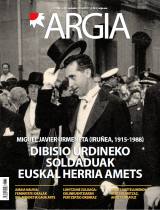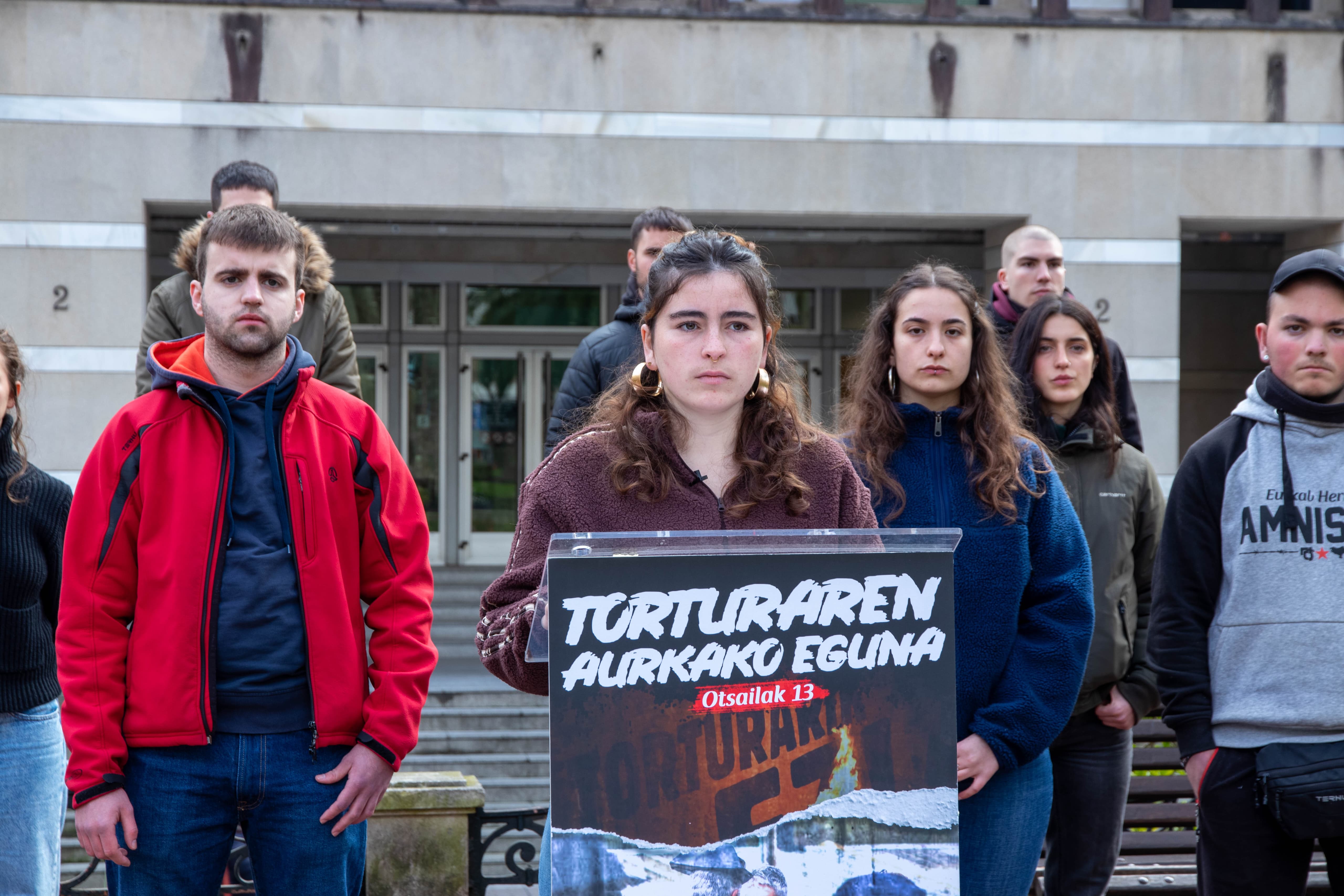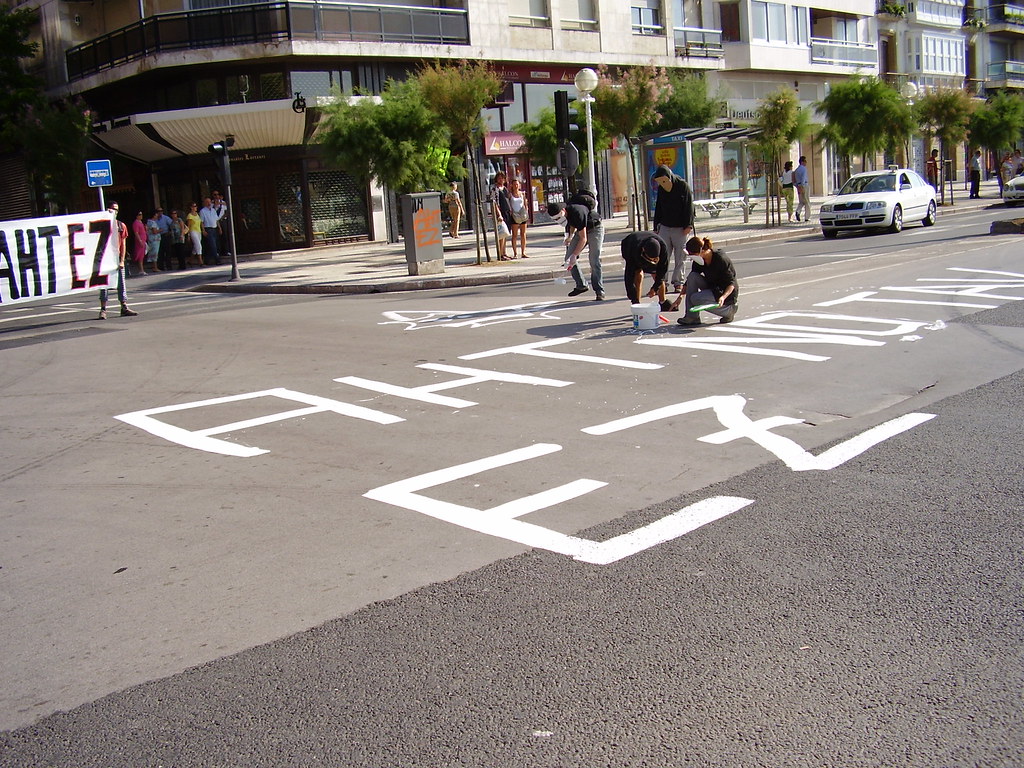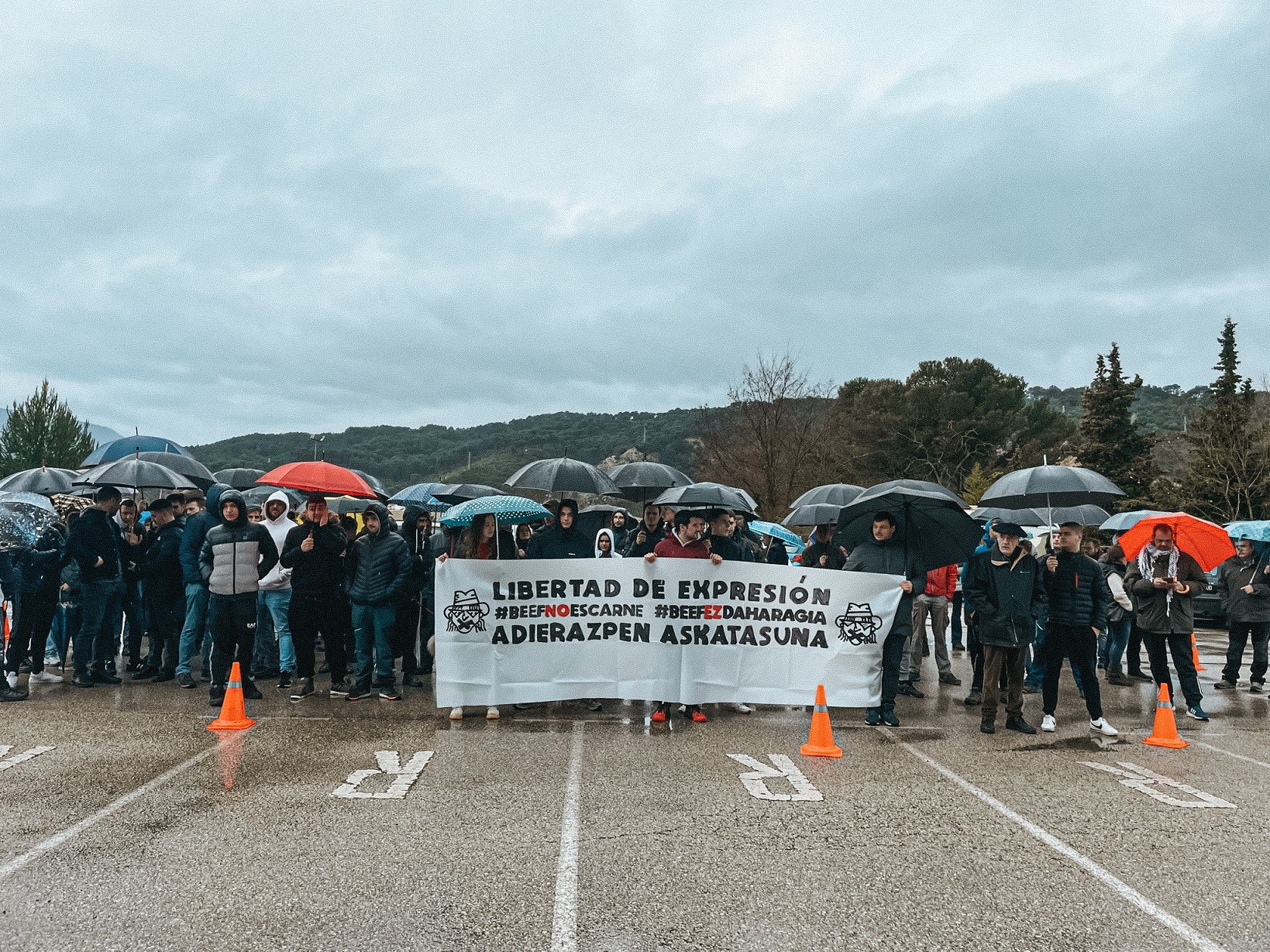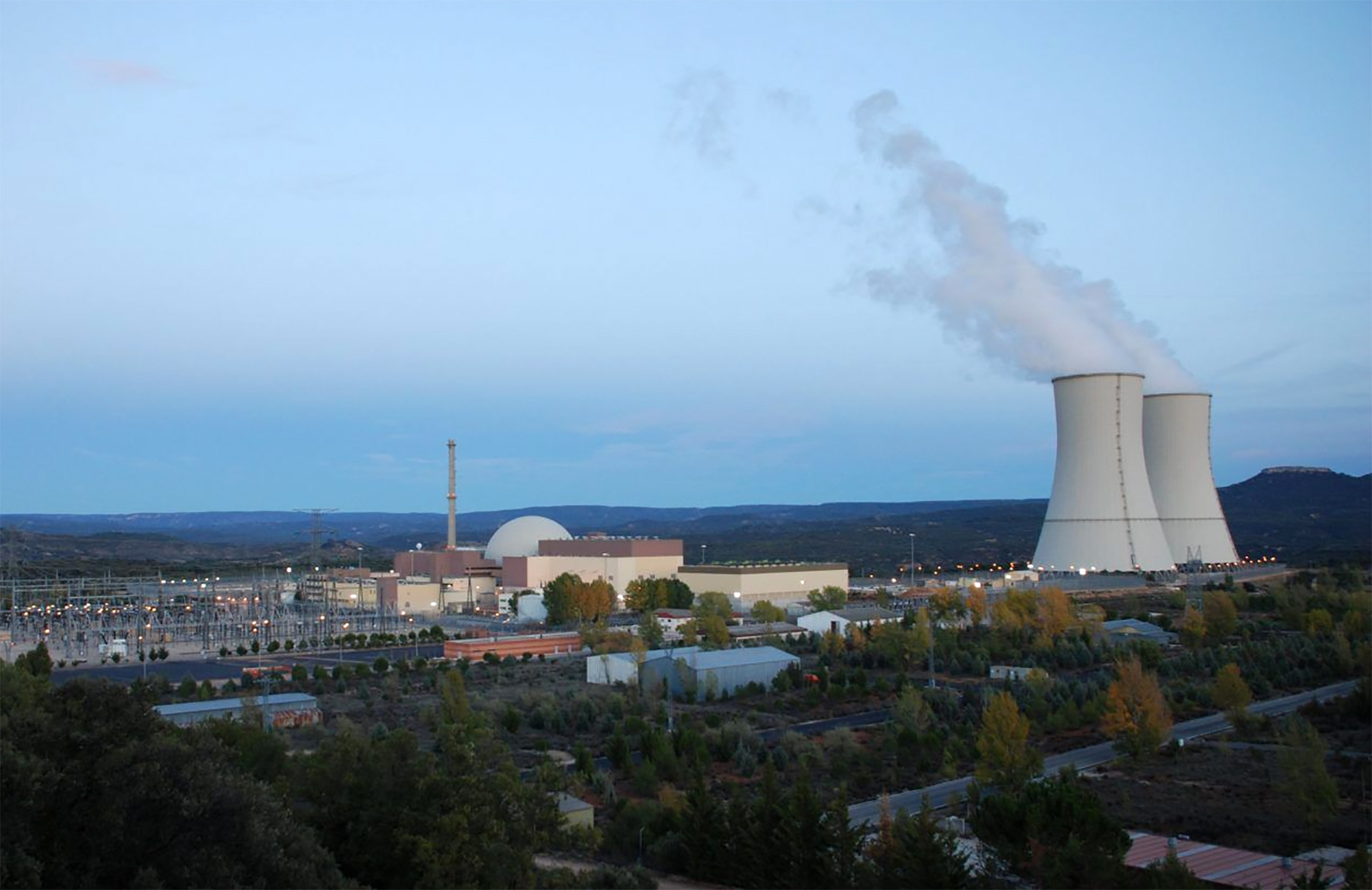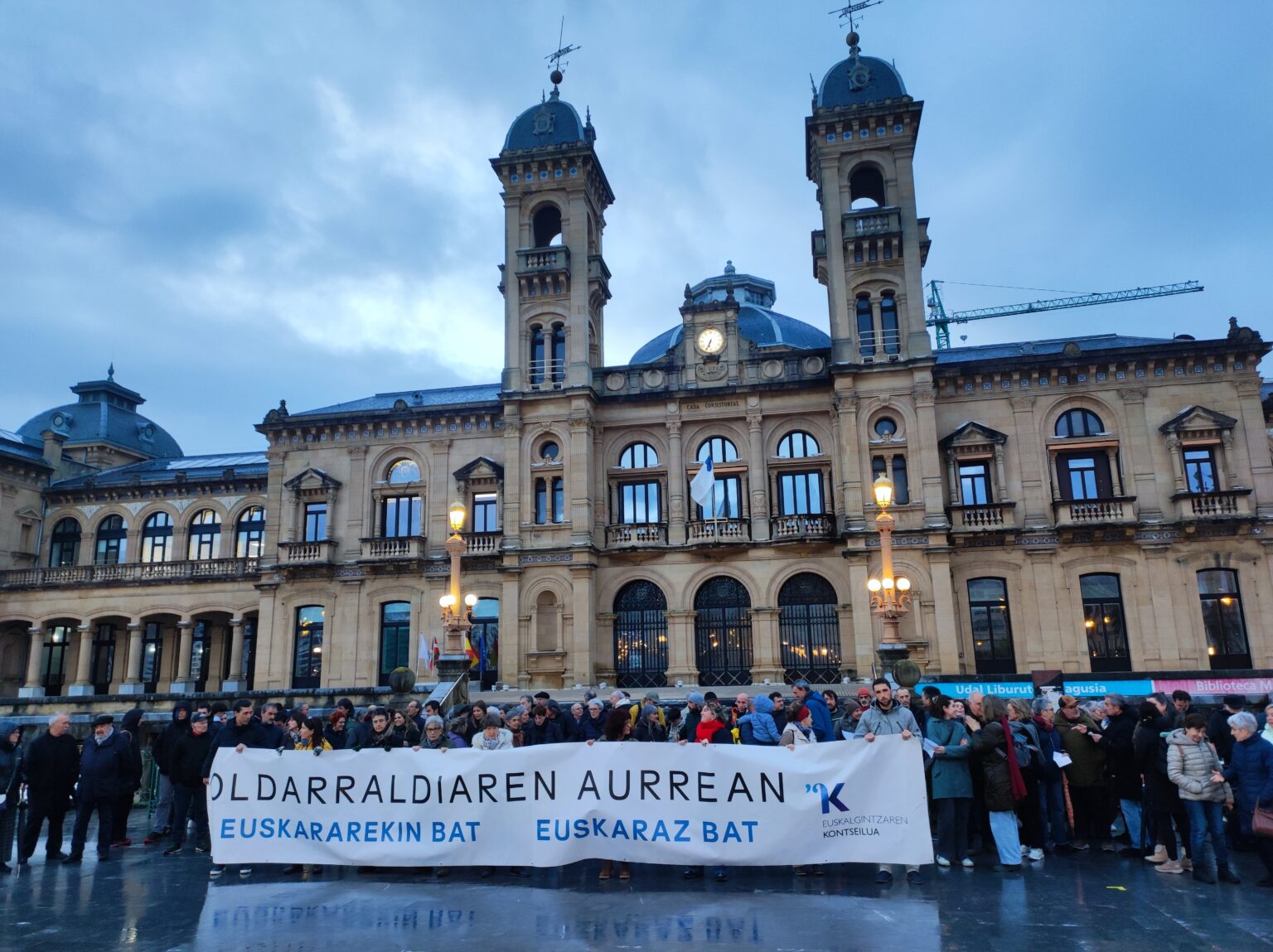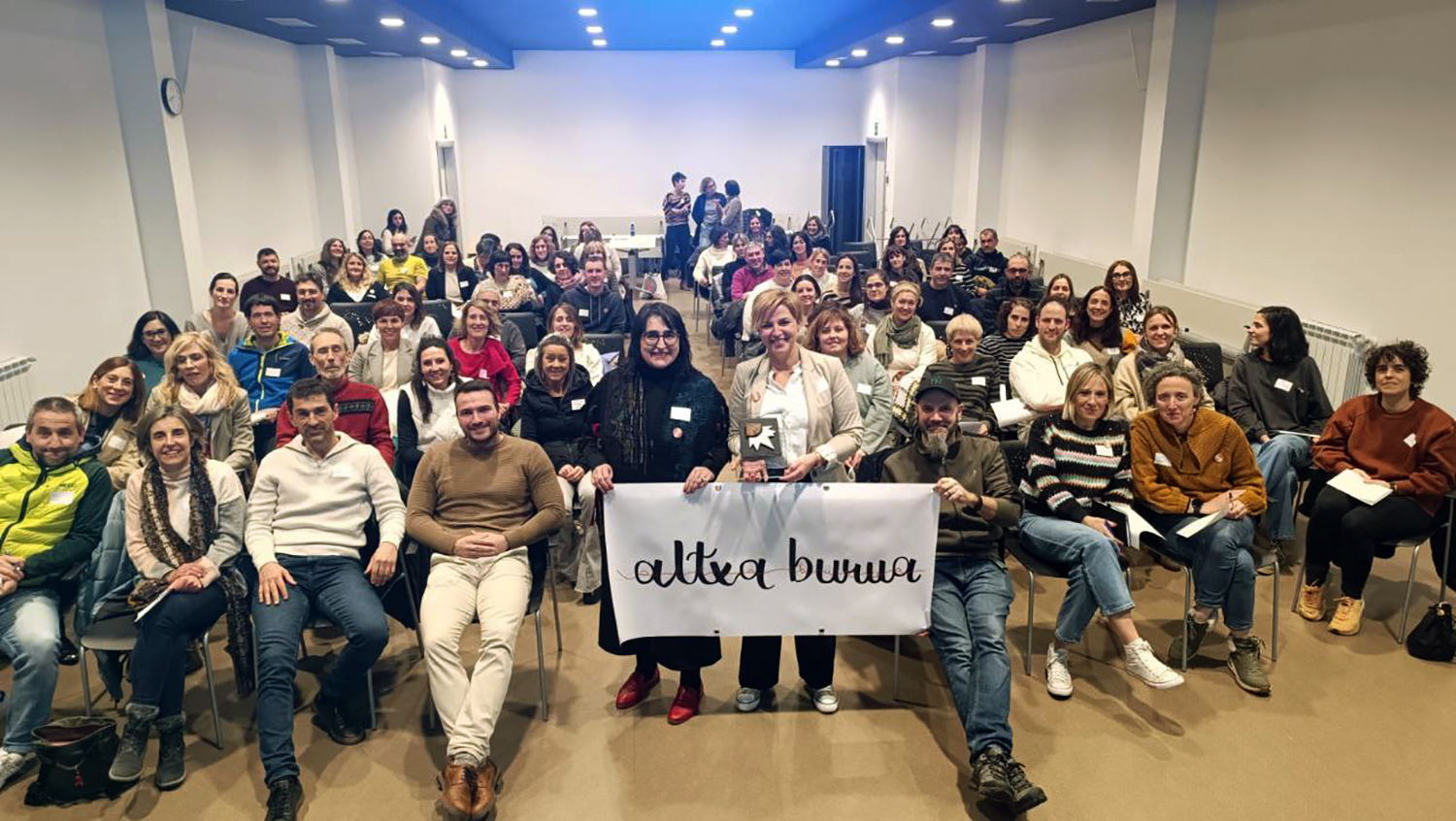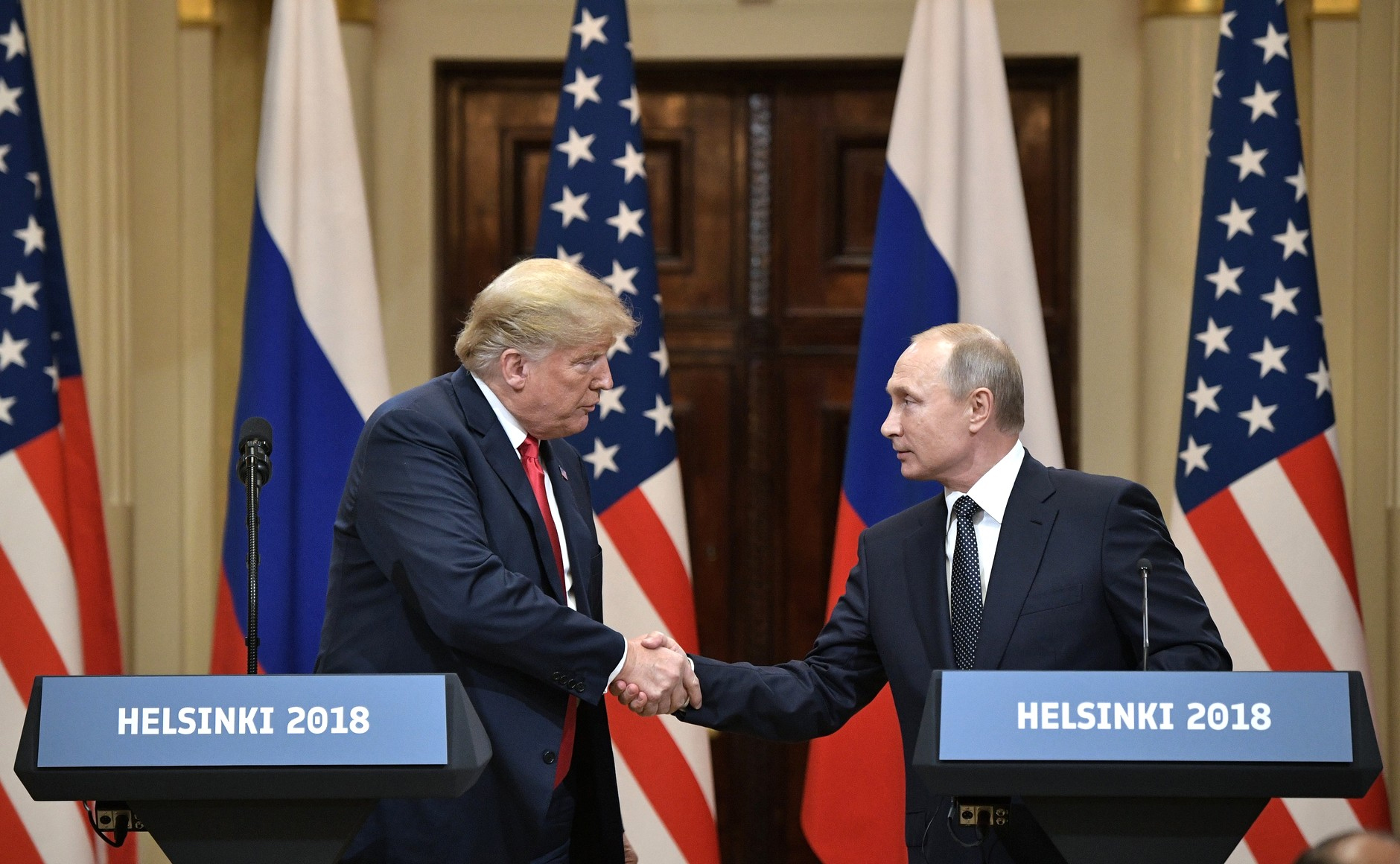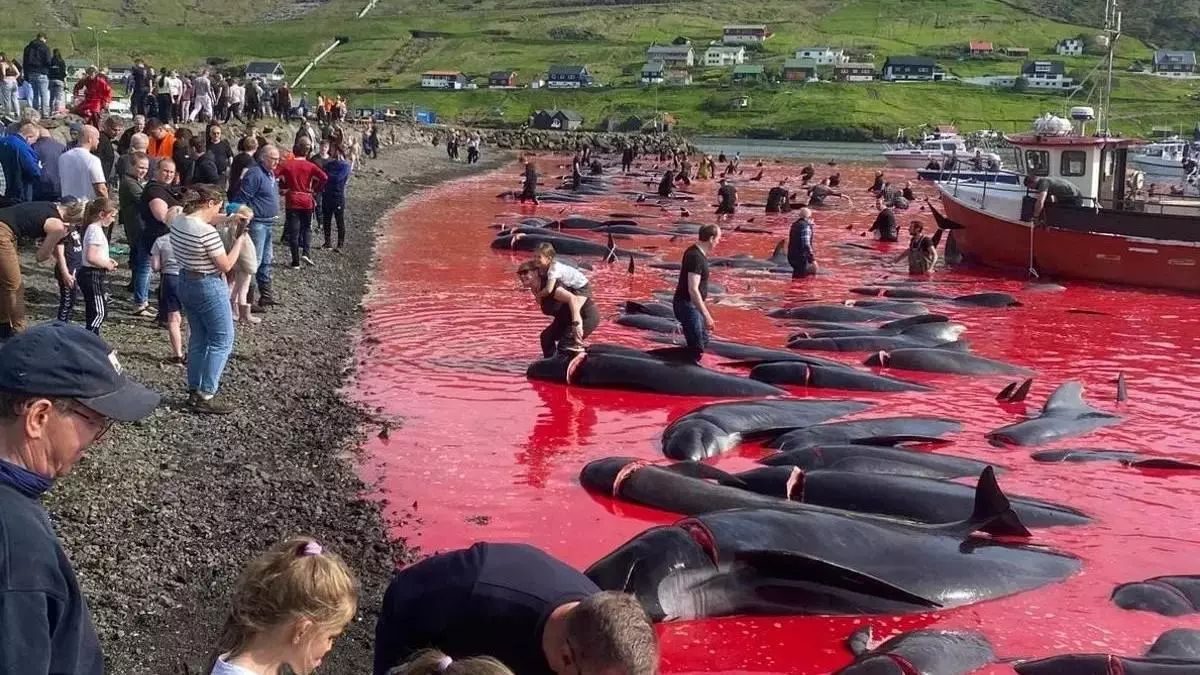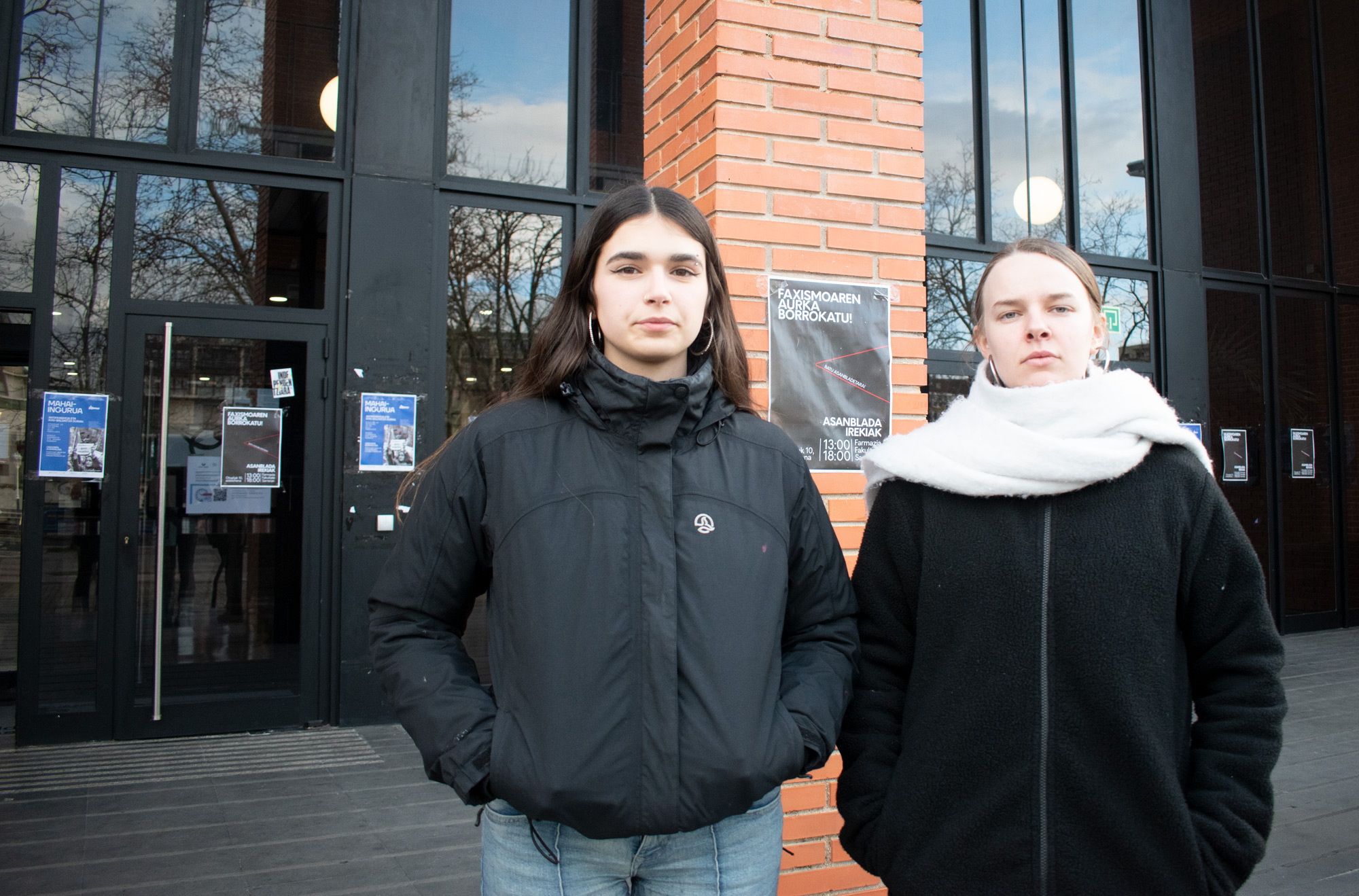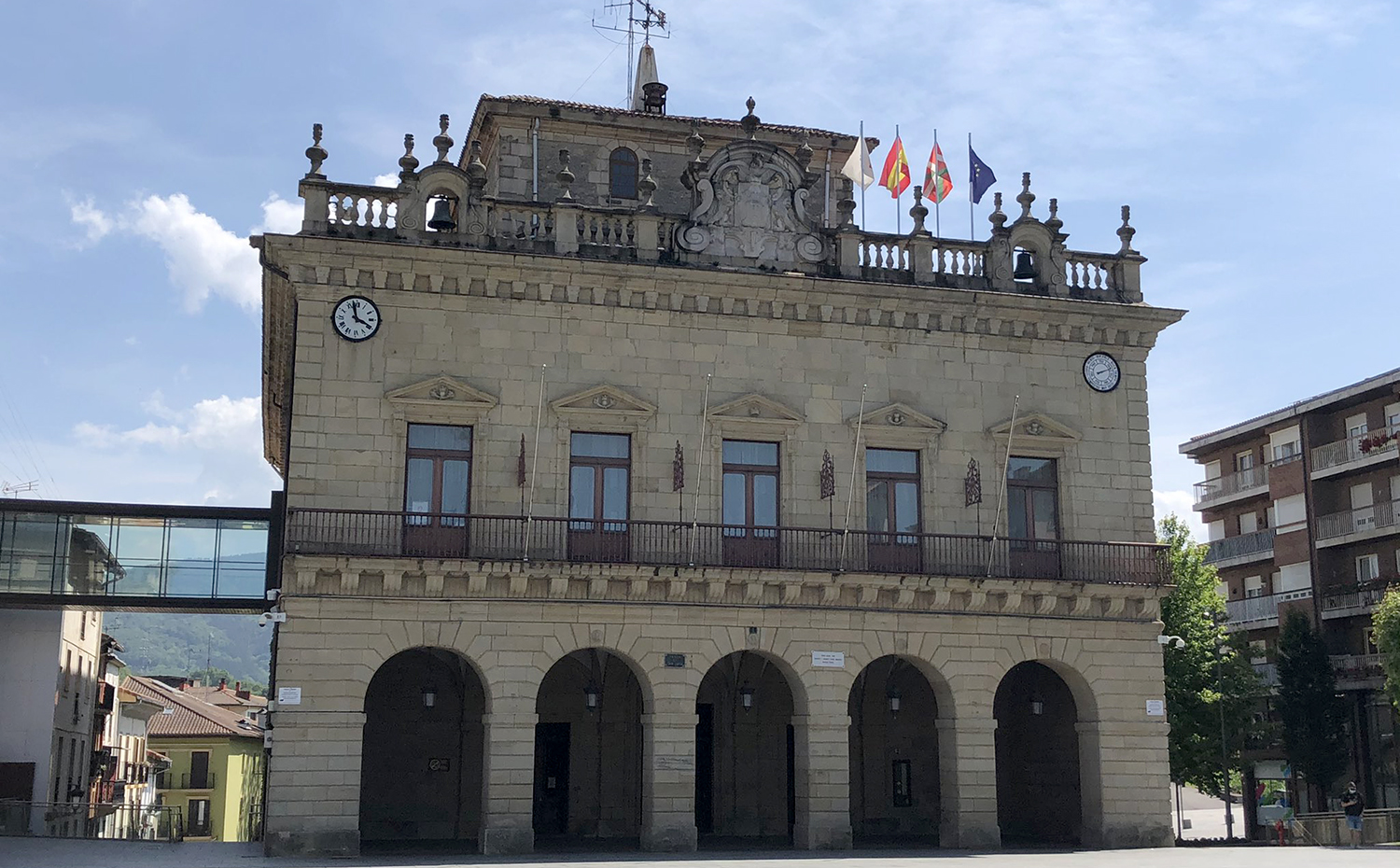The jeltzale trapped in the fabric of Franco
- Miguel Javier Urmeneta (1915-1988). Asisko Urmeneta, son of Miguel Javier, has translated the book La Segundo República, the Franco and the Transition into Basque. Soon you will notice the extraordinary biography of the character. Yolanda Barcina’s government awarded him the medal in 2014.
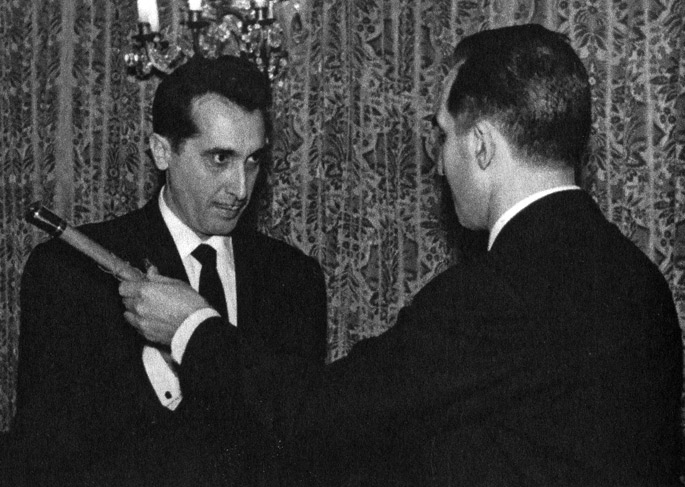
As a result of the coup d'état of 18 July 1936, the first arrests and firings in the Navarre capital began. In the past few days Alejo Heleta had told Maria Ajarnaute that they were going to fuse her husband, Ataulfo Urmeneta. José Solabre, confessor of the parish priests and requetés of Berriozar, also informed them that in case something happened, the son Miguel Javier was going to seek him immediately.
Ataulfo Urmeneta was known in Pamplona as a member of the PNV and Miguel Javier Urmeneta himself was also one of the most prominent members of Egi. In the following days, the young Urmeneta gathered her friends and told them: “You no longer have to think about who is going to do the war, but how are you going to do it.” And so they went with the requetés at the head of Madrid, like hundreds of other young and old people from Navarra, “volunteers”. As the father of eleven children, Ataulfo was exempted from going to war; in the following years he was prosecuted and his property was seized, but he survived. His son went to war to save his father, but his head got upset. “I joined myself for inexplicable reasons and for myself,” Miguel Javier wrote.
He supported Franco with the Carlist wars and, after the end of the war, volunteered in the Blue Division to fight the Nazis at Russia's war front as captain. Hitler's army awarded him the Iron Cross. Upon his return, he continued in the Spanish army until he obtained the post of Lieutenant Colonel. He had law studies and he knew English, he was a first-level student and also among the military. He was sent to the United States to study on behalf of the Spanish Army. At the age of 33 he was appointed commander of the Navy staff. He was also a professor of military and wrote about military tactics.
Mayor and Deputy Foral of Pamplona
He had travelled an important route in the Spanish army and who he was, which opened many doors in Pamplona in the following decades. In 1954 he was appointed director of the Municipal Savings Fund of Pamplona, following the death of his father, Ataulfo, former director, who occupied for 28 years. However, among other positions and works, he was Mayor of Pamplona (1958-64) and Deputy Foral (1964-1971).
He supported Franco with the Carlist wars and after that he volunteered in the Blue Division to fight with the Nazis
He was an unusual leader of Franco, until the closest ones told him he was not a Francoist. Throughout this time he did not forget the nationalism of his youth, nor the idea of the Basque Country and of the Basque Country Herria Batua, always within Spain. He was trapped in the spider's web of Franco in 1936, but it wasn't to stand still. Many advanced projects in the construction sector or in the neighborhoods of Pamplona have been carried out from the management of Kutxa and from the mayor's office. It also gave an important boost to industrialization, recovered the Ciudadela of the Army of Pamplona, promoted the Basque Country and culture, from the Provincial Council to the “plans” of the Basque Country… and in the 1960s his chair of the Provincial Council was key to the creation of the ikastolas of Navarra. It was also the one that opened the doors of Pamplona to the University of Navarra of Opus Dei. In a style of personalist leadership, he was a mayor and a popular deputy, as evidenced by the many tributes made. He was also appointed honorary member of the Royal Academy of the Basque Language.
He was offered numerous positions from Madrid and rejected the majority: to be a minister; civil governor of Álava, Bizkaia and Gipuzkoa in the Transition; educator of Prince Philip… Like many others, he was already looking at a time without Franco. But this curious military authority, acting as an intermediary in the workers’ strikes, had been accumulating more and more enemies in different parts of the regime, and was discarded even with conspiracy to prevent his return to the Office at the end of Franco’s reign. He continued to work as director of Kutxa and, admirer of Arturo Campión, presented himself to the 1977 elections with the Frente Navarro Independiente, created by himself. He had failed.
In recent years, the heterodox man who could receive at home the escapes of the demonstrations dedicated himself to the promotion of Basque and Basque culture with his many friends, including José María Jimeno Jurio, Pablo Antoñana or Jorge Cortes Izal: Promote the EU, help Korrika or create Euskalerria Irratia. He was the founder, shareholder and first lehendakari of the Media Association of Pamplona that supports radio. He lived with passion in painting and also immersed himself in the writing of his memoirs. He died in 1988 after leaving his wife and six children.
Iván Giménez in the book El Corralito Foral “talks about the amazing biography” of Urmeneta: “In the 1980s he also showed his fondness for the People’s Unit, making an incredible ideological turn, from the Blue Division to the surroundings of the Abertzale left.” This significant phrase by Urmeneta may have something to do with this conception: “I could take an important part of the Socialist Party, of European socialism; and the same could do, without an intractable attitude, with the broad areas of the PNV; and, finally, of truth, of Herri Batasuna.”
Miguel Beroiz, the fictional character of the novel Hodei Berdeak by the Pamplona writer Jon Alonso, also has a life full of lights and shadows. Beroiz was also a nationalist of young people, who later went to the War of 36 with Franco, and this is what a novel cousin says when he assesses his war stories: “And besides, here the theme was that Beroiz would tell you what the ways of making war were, and that is done, not to mention other ugly and macabre passages, that does not count them, and, what you mean, I will not be the one who reproaches him sin, man also has the right to beautify himself, which basically counts with the only condition of being true, and he has not been sufficiently proven for that.”
Zuk egin nahi zenuen liburua da hau edo familiaren enkargua?
Bata zein bestea. Barru-barruan nuen eta aspaldi ari nintzen esaten Miguel Javier Urmenetari buruzko doktorego tesia behar beharrezkoa zela. Baina ez dut inor konbentzitu hortaz. Nire obsesioetako bat zen, ezin baita Nafarroako XX. mendeko historia politiko-instituzionala ulertu Urmenetaren figura argi izan gabe. Duela lau urte Asisko adiskideak aipatu zidan 2015erako gustatuko litzaiekeela aitaren historia bat egitea eta azkenean ni neu animatu nintzen. Eta ekin nion, besteak beste, familiak Urmenetaren artxiboa digitalizaturik zuelako eta hori ikerlari batentzat sekulako abantaila delako.
Zer egin zaizu zailena?
Uste nuen bere historia ezagutzen nuela eta, gainera, lehendik berari buruz zegoen lanik mamitsuena nire aitak [José María Jimeno Jurio] idatzitako sarrera bat zen, bere memorien bigarren alera. Orain XX. mendeko gure historiaz eta Urmenetari buruzko gauza berri asko ikasi ditut, eta baita familiak berak ere, batzuk oso gogorrak, nire ideologiaren guztiz aurkakoak.
Liburuan dokumentazio lan itzela dago, baina iruditu zait bere gauza onak azpimarratzen direla batez ere.
Ez. Ezezagunak ziren gauza asko ateratzen dira, eta bere memorietan agertzen ez direnak. Adibidez, gerra zibilaren ondoren, bere lehen destinoa Auritzen izan ziren preso errepublikarren kontzentrazio gune bateko buru. 23-Fko militarrekin zituen adiskidetasunak eta beste asko. Dibisio Urdinean Burdinezko Gurutzea lortu zuela aipatzen badut, ez dut gauza positibo gisa esaten, jakina, baina lortu zuen eta kontatzen dut. Gauza onak eta txarrak zituen, eta guztiak aipatzen dira.
Gerraz gutxi hitz egiten da liburuan.
Berak bere memorietan oso gutxi hitz egiten du, ikusten da ez duela nahi hortaz aritzea, baina militarra izan zenean, irakaslea izan zen eta bere obran baditu hainbat artikulu aldizkari militarretan teknika militarrei buruz. Badu doktrina militarra, baina ez doktrina ideologikoa eta hori salbuespen nabarmena da garai hartan idazten zuten militarretan.
Asko egin zuen eta asko idatzi zuen, baina frankismoaz ez du hitz egiten oro har. Frankismoaren barruko gizon teknikoa da bera?
Berak ez zuen bere burua frankistatzat hartzen, nahiz eta alkate kargua edo diputatu kargua hartzen zuenean eta hitzaldia egin zerbait esan behar zuen; baina halakoak gutxi ziren eta egoerak eskatuta. Bere politika oso teknikoa izan zen, baina bere ideologia ez frankistatik apustu irmoak egin zituen politikatik. Bera alkatetzara heldu aurretik Txantreako kale guztiei bando nazionaleko erorien izenak jartzen zitzaizkien eta bera heltzean politika hori moztu eta herrien izenak jarri ziren. 1965ean, adibidez, diputatu zenean eta Enbatakoekin zuen harreman handia medio, Kristiane Etxaluz etakidea lagundu zuen hau Iruñeko espetxean zela, Erorien Monumentua zartatzeko ahaleginaren ondoren. Erorien Monumentuari izaera frankista kentzeko proposamena egin zuen orduan Urmenetak, baina ez zioten onartu. Garai hartarako memoriaren oso ikuspegi aurreratua zuen. Zeresanik ez euskara eta euskal kulturarekiko, berarengatik izan ez balitz, garai hartan ez zen ikastola bakarra irekiko Nafarroa osoan. Oso teknikoa zen, baina bere ideologia ere sartzen zuen.
Sartzen zuen frankismoarentzako ere mehatxua ez zelako, areago, batzuetan irudi zabal hori izatea ere komeni zitzaiolako.
Frankismoan militarrek oso teorizatua zuten haiek izan behar zutela gidari politikan. Goi mailako militarra izanik, bere estatusak ez zuen parekorik Nafarroan eta inork ezin zion deus ere esan. Noiz hasi zitzaizkion gauzak okertzen? Frankismoaren amaieran edo Trantsizioan, militarren izar hura itzaltzen hasi zenean.
Nola baloratzen duzu Nafarroako Gobernuak 2014an emandako dominen afera?
Felix Uharteri eta Urmenetari eman zizkien dominak, baina uste dut batez ere Uharteri eman nahi ziotela eta horretarako Urmeneta baliatu zuela, Uharteri bakarrik ematea legez kanpokoa izango zelako memoriaren ikuspegitik: frankismoan egindakoagatik ematen zitzaion domina eta gainera bera frankismoan hil zen, gero ez zuen ibilbide demokratikorik izan. Beraz, Urmeneta sartu zuten, aurreikusten zen polemika itzali asmoz.
Memoriaren Autobusa eta halakoetatik kritika gogorrak egin zitzaizkien bi dominei eta Urmenetaren kasuan txinpartak sortu ziren. Zuk aipatu izan duzu ez zenituela kritika horiek ulertzen.
Ez, ez da horrela. Nik kolektibo horietako partaide naiz eta oso gertukoak sentitzen ditut, baina esan izan dut egindako kritika batzuk testuingurutik kanpo egin zirela eta beste batzuk datu faltsuetan oinarritzen zirela, esaterako Urmeneta Uharteren enpresetan sartuta zegoela eta halakoak. Urmeneta izan zena izan zen, gerra zibilean aritua, Errusian Dibisio Urdinean… hori guztia nik ere esaten dut liburuan, baina memoria historikoaren ikuspegitik aztertuta, aitortu behar zaio pioneroa izan zela estatu mailan modu instituzional batean frankismoaren sinboloak kentzen, eta hori ez zaio aitortu.
Gauza asko entzun eta irakurri ziren, baina funtsean, aipatzen zen ez zuela domina hori merezi.
Ni ere ados nago horrekin, ez zuen merezi frankismoan egindakoagatik zelako; aldiz, bere ibilbide osoagatik izan balitz, ados nengoke dominarekin. Bere ibilbideak iluntasun handiak izan zituen, baina bere bizitza guztia hartuta Nafarroarentzat oso positiboa izan zen.
Liburuaren originala erdarazkoa da eta egile gisa zu agertzen zara azalean. Euskarazkoan zu eta Asisko Urmeneta –itzultzailea– agertzen zarete, eta ez du ez oin-oharrik, ez bibliografiarik, mutilatua dago beraz. Zergatik?
Itzulpena Asiskorena da, baina hori baino gehiago ere bai. Berari gustatuko litzaiokeen liburua egin du, nire edukia aldatu gabe, baina ekarpen batzuk eginda: sarrera oso pertsonala, oin-ohar asko testuan integratu ditu, bibliografia kendu dio... Nire liburua formaz ortodoxoagoa da, Asiskoren lana, batez ere itzulpenean euskararekin egindako apustuagatik, literarioagoa.
Liburuarekin irudi luke arantza bat kendu duzula.
Arantza baino gehiago, liberatu naiz eta aita lurperatu dut. Hil zenean 22 urte nituen, bosgarren semea, garai hartan nahiko punkia… aita zaharra, militarra izana Iruñea txiki hartan… Izena galdetzen zidatenean Asisko esaten nuen eta abizena Urmeneta, baina azken hau aho txikiarekin eta berdin haren semea nintzela. Maite nuen, baina urtetan gaizki eraman izan nuen. Gero, iazko dominen afera bizi izan genuen eta oso gogorra izan zen. Roldánen lan hau oso ongi etorri zait alde horretatik, barrenak mugitu dizkit, negar franko egin dut eta asko ikasi dut aitaz. Ez dut bere ibilbidea justifikatuko, ez da nire lana –hark ere ez luke egingo seguruenik–, baina Roldánek eman ditu manera koherente batean nik etxean nituen aitaren argazki haiek guztiak. Azkenean aita ezagutu dut.
Erdarazko liburuan Roldán Jimeno da egilea. Euskarazkoan aldiz, itzulpenean, biok agertzen zarete egile gisa eta liburuak ez du oin-oharrik eta bibliografiarik. Zergatik?
Nolabait esateko, Roldánen lana da zientifikoa eta nirea agitatzailearena. Nire asmoa zen kapitulu bakoitzean aipatzen zena etxekook nola bizi genuen lehen pertsonan kontatzea. Denbora faltagatik azkenean dena aitzin solasean bildu behar izan nuen. Itzulpena oso fidela da Roldánek idazten duenarekiko, baina testuaren lagungarri diren ohar erudituak kenduta.
Frankismoko pertsonaia garrantzitsua izan zen Nafarroan, baina liburuan aipatzen da ez zela frankista izan. Nola ulertzen da hori?
Une historiko honetan frankismoko gertaerak frankistatzat hartzen ditugu. Biharamunean Euskal Herriak independentzia lortuz gero, erran ahal izango genuke, erraterako, Uxue Barkos monarkia borbonikoaren agente bat dela? Hartu Dominique Garat Ustaritzekoa: borbondarren monarkian aritu zen diputatu lapurditik, gero Estatu Orokorretan saiatu zen Lapurdiren alde egiten, geroago berak irakurri zion heriotza kondena erregeari, Konbentzioan ere ibili zen… beti boterearen bueltan baina beti Lapurdiren alde. Aitaren kasuan ere, beharrik izan direla jende batzuk etorkizuna ikusi dutena eta herriaren alde lan egin dutenak. Bera ez zen aberastu, esaterako [Felix] Uhartek egin zuen bezala.
Etxeko giroaz. Aita armadako teniente koronela izan zen, baina etxean ez zen giro militarrik bizi. Esaterako, berak lagundu zigun soldaduzkatik libratzen. Nik liburuarekin jakin izan dut aitatxi abertzalea zela, bere familia osoa… etxean isiltasun erabatekoa zegoen halakoen inguruan. Euskaltasuna bai, Iparraldea… baina dena oso lausotua.
Familia jeltzalea eta bereziki aita salbatzeko joan omen zen reketeekin Francoren alde. Berak hitz egin al zizuen noizbait ataka horretaz etxean?
Ez hortaz, ez gerraz. Noizbait atera zen etxean karlistak fatxak ote ziren, eta berak ezetz, XIX. mendeko gerra karlistetako karlistak espartinetako jendea zela zioen. Aita bulego gizona izan zen, baina beti espartinetako jendeen alde, oso ikuspegi sozial handia zuen. Potasaseko langileen greban [1974], adibidez, bera hautatu zuten bitartekari lana egiteko enpresarekin.
Aitzinsolasean aipatzen duzu amarauna eta hartan harrapatua gelditzen den eulia, aita alegia. Eta betirako geratu zen harrapatua sarean.
Obszenitatea zen 1936ko uztailaren 18aren biharamunekoa. Jendea behartzen zuten haien alde soldadu joatera, baina egiazki ez zirela haietakoak. Horixe zioen Rafael García Serranok aitari buruz: “Ez lehen, ez orain, Miguel Javier Urmeneta ez da inoiz izan gutarra”. Frankismoaren amaieran aita saiatu zen eratzen elkarte demokratiko bat Nafarroan, irekidura maila bat eta Euskal Herriaren aldeko jarrera izango zuena, baina Arias Navarro, Fraga, Martín Villa eta beste hainbatek bide guztiak itxi zizkioten berriz ere Diputaziora itzultzeko. Domina nazia eta beste hainbat domina militar izanagatik ere, erregimenak nahiko argi zuen nor zen Mikel Xabier hori, bai 1935ean bai 1974an ere.
Nola bizi izan zenuen iazko dominaren afera?
Izugarri gogorra izan zen. Diario de Navarratik sekulako loreak aitari, egunkari hori beti aitaren aurka ibili zenean eta aitak ikusi ere ezin zuenean. Eta euskal medioetatik kritika ikaragarri gogorrak aitaren borroka beti haien alde izan denean. Liburuaren azken kapituluan Roldánek dominaren aferari buruzko kronika egin du eta han bakoitza ondo erretratatua ateratzen da. Yolanda Barcinaren maniobra politikoa izan zen aita eta Felix Uharteri domina batera ematea, eta denok erori ginen haren tranpan. Lehen unean oso ahots gutxi atera ziren aitaren alde, gero bai. Laburbilduz, uste dut garai historiko bakoitzean begiratu behar dela nork egiten duen egiazki herriaren alde eta nork ez.
(Santi Leone historialariaren iritzia)
Segur aski, bigarren kapituluan dugu Migel Jabier Urmenetaren biografiako analisi ideologiko luzeena, Amayur aldizkarian Urmenetak eta haren aita Ataulfok Euzkadiko Historia grafikoari eskaintzen diotena hain zuzen ere. Hortik abiatuta, etorriko diren urteetako eboluzioan gauza anitz esplikatzeko balio duen oinarrizko oposizioa ezartzen zaigu: barneko abertzalea vs kanpoko erregimeneko gizona; edo iraganeko abertzalea vs haren pindarrak barnean daramatzan itxurazko frankista; edo gauza “txarrak” –barkatu sinplekeria– behartuta egin zituen gizona vs gauza “onak” egin zituen politikari eskuzabala. Eskuzabala izan zela argi gelditzen baita biografia honetan, eta herrikoia, eta hurbila, eta zintzoa, eta langilea. Eta nik ez dut hori –argi gera bedi– zalantzan jarriko. Baina alde humanoa baino gehiago, alde politikoa ezagutu nahiko genukeen. Euskaltzalea zela erratea ez baita aski, euskaltzaletasuna kontestualizatu beharrik ez duen kategoria balitz bezala.
Hein handi batean, gizonaren biografia dugu hau, ez politikariarena: ez jarduera politikoaren berri ematen ez delako, baizik eta hura bertute humanoen bidez azaltzen delako. Eta hori akatsa da. Akatsa den bezala Asisko Urmenetari, itzultzailea izanik, egiletza aitortu izana euskarazko bertsioan, eta itzultzaileari inolaz ere ez dagozkion erabakiak hartzea –oin-oharrak eta bibliografia desagerraraztea– onartu izana, hark “zer monografia-mota irakurriko lukeen” aintzat hartuta. Hortxe baitago, naski, koxka nagusia. Liburu baliotsua idatzi du Roldán Jimenok, eta euskara ederrera bihurtu du Asiko Urmenetak, baina, halere, uste dut aukera galdua dela biografia hau. Migel Jabier Urmenetaren lan onak zerrendatzea gutixko da, eta euskal irakurleari narrazioa inolako aparatu kritikorik gabe sinets dezala eskatzea, soberaxko.
Epistemology, or theory of knowledge, is one of the main areas of philosophy, and throughout history there have been important debates about the limits and bases of our knowledge. Within this we find two powerful corridors that propose different ways of accessing knowledge: The... [+]
We learned this week that the Court of Getxo has closed the case of 4-year-old children from the Europa School. This leads us to ask: are the judicial, police, etc. authorities prepared to respond to the children’s requests? Are our children really protected when they are... [+]
Gabonetako argiak pizteko ekitaldia espainolez egin izanak, Irungo euskaldunak haserretzeaz harago, Aski Da! mugimendua abiatu zuen: herriko 40 elkarteren indarrak batuta, Irungo udal gobernuarekin bildu dira orain, alkatea eta Euskara zinegotzia tarteko, herriko eragileak... [+]









